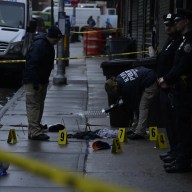By Jeremy Walsh
More municipal budget cuts are coming, but Queens City Council members were hesitant to get behind several drastic measures proposed last week by Mayor Michael Bloomberg.
Estimating a budget gap of $4 billion between now and the end of the 2010 fiscal year, the mayor suggested eliminating 3,000 city jobs through layoffs and freezing of positions, reducing the police force, ending nighttime shifts at five fire engine companies, cutting education funding by $586 million over two years and abandoning property tax cuts and rebates to homeowners.
Bloomberg said the cuts are necessary because of a projected loss in tax revenues from Wall Street, which was hit hard by turmoil in the markets that came after the Council approved a budget for the 2009 fiscal year.
Most controversial was the repealing of the $400 property tax rebate the Council approved in the 2009 fiscal budget.
“The time to have discussed that or potentially revoked it was last June,” said Councilman David Weprin (D−Hollis), chairman of the Council’s Finance Committee. “If it’s not illegal, it should be. That’s almost like saying, ‘We sent you those checks the last four years, just send the last one back.’ ”
The Council was slated to hold hearings on Bloomberg’s proposals the week of Nov. 17, Weprin said.
Councilman Leroy Comrie (D−St. Albans) said he was “vehemently opposed” to not issuing the rebates and eliminating the planned 7 percent property tax reduction.
“Rescinding the promised tax relief that homeowners were expecting puts a serious dent in people’s planning,” he said, noting his office had received many calls from constituents asking about when their checks would arrive.
Councilman Peter Vallone (D−Astoria), chairman of the Council’s Public Safety Committee, attacked Bloomberg’s plan to eliminate the January 2009 police academy class in order to reduce the number of officers.
“The quickest way to hurt the economy even more is to make the streets less safe,” Vallone said in a statement, calling for hearings on the police cuts. “You only need to read the graffiti writing on the wall to see the effects of allowing the police force to decline.”
The mayor’s plan also includes a cut in funding to the city’s public library systems, including Queens, which has the highest circulation of any library in the country.
“Obviously we’re concerned and we are taking a very close look at it,” said Queens Library Governmental Affairs Director Jimmy Van Bramer. “It’s premature to discuss reductions of service in any concrete way, but we’re hopeful still that the City Council will be able to work with the administration in trying to stand firm on six−day service.”
The Council members had a few ideas of their own on how to reduce the impact on their constituents.
Weprin proposed moving up the elimination of the 7 percent property tax cut to January 2009 from July 2009.
“It’s certainly something that should be discussed,” he said, estimating the move could bring the city an additional $700 million in tax revenues.
Comrie urged the mayor to consider implementing a 1 percent hotel tax increase to boost city revenues and reinstating the Stock Transfer Tax, which was phased out in 1978.
He pointed to an Independent Budget Office report issued five years ago in response to budget issues after the Sept. 11 terrorist attacks, estimating the increase would bring the city a revenue gain of $2 billion.
Comrie also suggested reinstating the commuter tax, which was repealed by the Legislature in 1999.
“Suburban New Yorkers utilize our city services each day when they commute to and from work,” he said. “It is in their interests to ensure that those services remain viable.”
Reach reporter Jeremy Walsh by e−mail at jwalsh@timesledger.com or by phone at 718−229−0300, Ext. 154.
































